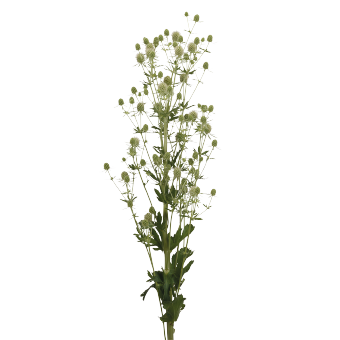

Glitter White
Item no.: EP4101R- FastraX perennial: First year flowering without vernalization
- Long lasting, spiny flowers on vigorous plants
- Structural plant for floral arrangements
- Thrives under hot and dry conditions
- Crop Time
- Spring: 22 - 24 weeks
- Height ∅
- 37 ″ / 95 cm
- Exposure
- Sun
- Seed Form
- Raw Seed
- Heat Zone
- 12-1
- Hardiness Zone
- 4-8
- Best Uses
- Bedding, Cutflower, Landscape
Culture guide
Usage
Perennial, first year flowering. Cutflower, large containers, perennial borders, attractive for bees and butterflies
Sow time
December-March for flowering plants from June-August; July-August for larger flowering plants in the following year
Sowing method
1-2 seeds per plug
Germination
7-10 days at temperatures of 72-75 °F (22-24 °C) under lights.
Growing on
Grow on at 60-70 °F (15-21 °C). Fertilize at 50-100 ppm nitrate nitrogen after initial transplant, increasing to 100-150 ppm once plants are well established.
Media
Use a well-drained, growing perennial substrate, pH: 6.0-7.5. Field: humus, sandy loamy soils with good drainage.
Temperature
Grow at 15-18 °C / 59-64 °F or outdoors. In winter indoors frost free at 3-5 °C / 37-41 °F or outdoors. Outdoor fleece cover needed. In spring the plants start to grow at 12-18 °C / 54-64 °F or outdoors at ambient conditions. Containers can be stored in cold storage and set up in intervals for forcing afterwards.
Fertilization
High fertilization levels are required.
Stage I Starts with the radicle breaking through the testa. The roots are touching the medium. Ends with fully developed cotyledons.
Stage II Starts from fully developed cotyledons. Ends with the fully developed true leaf or true leaf pair.
Stage III Starts from the fully developed true leaf or true leaf pair and ends with 80% of the young plants being marketable.
Stage IV All young plants are ready for sale and in the process of being hardened off. This stage lasts about 7 days.
The cultural recommendations are based on results from trials conducted under Central European conditions. Different conditions in other parts of the world may lead to deviations in results achieved.
